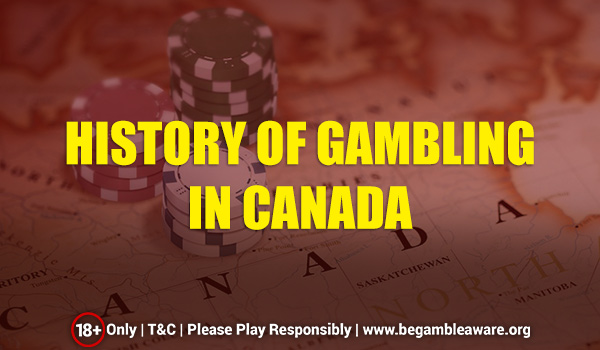The human mind is beset by all manner of primitive urges. While it’s probably best that we don’t explore some of the more obvious manifestations here, there’s one particular impulse that’s entirely in keeping with the subject matter of this site. Yep, that’s right: gambling or namely, gambling in Canada. Join as now as we go back in time…

A Very Brief History of Canadian Gambling
In 1497, Italian explorer John Cabot landed on Canada’s East Coast after a long and strenuous voyage from the UK. To while away the thirty-five days or so that it took to reach the New World, he and his crew spent many hours playing cards.
Hoping to fleece the indigenous population (just kidding) Cabot was rather put out to discover that the natives were already occupying themselves with their own games of chance.
Although Cabot initially tried to convince himself that their primitive games were some kind of ancient spiritual exercises, he was dismayed to discover that the tribe had been trying their luck since around 6000 BC.
The Dark Ages
Nevertheless, the gambling activities enjoyed by Canada’s indigenous peoples had a few limitations, namely that they were played with sticks, pebbles and bones. Happily, these shortcomings were eventually rectified by the widespread colonisation of North America. Along with smallpox, European settlers introduced the kind of gambling paraphernalia that’s still used in casinos around the world such as dice, cards and, um, backgammon boards…
However, many of the gambling games inflicted on Canada’s tribes had been outlawed under British common law for around 100 years. By all accounts, Richard III believed them to be a major distraction for his soldiers. Thus, Canada’s first Criminal Code of 1892 upheld these conservative rules and banned all gambling games indefinitely.
The Enlightenment
The strict and robust regulations laid down by Canada’s hand-wringing lawmakers lasted all of eight years. In 1900, an amendment to the Criminal Code allowed for bingo and raffles, provided that all funds were donated to charitable purposes. This was followed, ten years later by horse racing. Then in 1925, agricultural fairs and exhibitions were permitted to hold gambling games.
Despite this, gambling was still frowned upon, especially among the political classes. Finally, in 1969 the penny dropped when the Canadian Government discovered just how useful lottery games could be in raising money for special projects and noble causes. The ticket proceeds could also be taxed to hell and back. So the Criminal Code was amended once again to enable federal and provincial governments to operate lottery games. The first national lottery was held in 1974 to help raise funds for Montreal’s Olympic Games.
Casinos were also granted amnesties and began to pop up throughout Canada. The first was unveiled in Winnipeg in 1989 followed by establishments in Manitoba, Quebec, Ontario, Saskatchewan and Nova Scotia. Finally in 2004, the Canada’s first legal online casino, PlayNow.com was launched, paving the way for thousands of web-based gambling dens. And that folks brings us pretty much to the present day.
Author: Adrienne
Posted On: 25/07/2019
-
Basic Online Roulette Strategies
As with our ...
-
Basic Strategies of Online Blackjack
For the pur ...
-
Land-Based Casino Games in Canada – An Overview
Despite the ...
